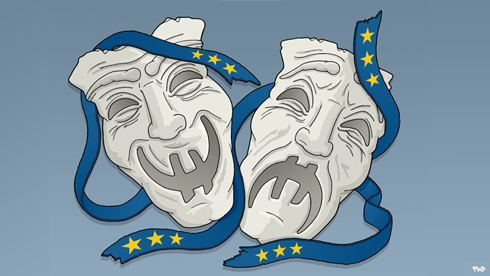When writers want to change the course of a story, they use what is called a plot twist. That is what the Greek government has been up to in recent weeks: finding the twist in the narrative of the crisis. “Nobody is talking now about a Greek exit, but about a Greek recovery: a Grecovery,” declared Prime Minister Antonis Samaras on June 13 following a meeting with his Finnish counterpart in Helsinki. An effective slogan for the message that the executive has been selling for months now, first with some caution and now more emphatically: that the risk of a Greek exit from the eurozone has passed, and the time for the recovery has arrived. Recent data on the improvement of the economic mood, the decision of Fitch to ramp the debt rating up a notch, and the truce with the markets are all lending arguments to start writing the opening lines of “a success story”, as Samaras felt inclined to do during a recent official visit to China.
But the plot twist hit on by the government does not fit into the script of the day-to-day life of the Greeks. “So what if they say that things are getting better? My portfolio is as empty today as it was six months ago,” says Illyria, a 36-year-old self-employed graphic designer. “I work, yes, but the money isn’t coming in,” she disconsolately says, looking towards Syntagma Square. On the day the European mobilisation against the troika was announced last week, the square was half-deserted. “Where are the people? What do we have left if we don’t protest?” she repeats, while two of the few protesters try to hang up between two trees a banner bearing the slogan “The people united against the troika”.
The empty square is not a symptom of growing optimism. If the demonstrations are no longer so massive six years into the great crisis, it is because three years of unbroken austerity has also worn out the crowds. Several groups hit by the cuts still gather every day, but their protests have grown less intense.
“We would have to talk for hours about why people are not out on the street,” acknowledges Alex, one of the few who attended a recent pan-European protest. "But it’s also because people are tired of so many protests, and many now focus only on getting on with their lives,” adds the engineer, who in 2010 decided to return to Greece from Denmark, where he worked after finishing his post-graduate studies. He has begun to work on his own, though he admits that orders are scarce.
“The reason there are fewer people in the demonstrations is that one protests when one has a hope, when one thinks that things can change,” says Dimistris Cristopoulos, professor of political science at Panteion University in Athens. “In recent months, the centres of political power have been trying to sell the story that we are doing well. We have to ask ourselves three questions: Is it true? Is this just a communication strategy? Is this strategy working? The answer to the first one is: no, it is not true. The second answer: yes, it is a communication strategy, because we must all understand that this violent experiment to which Greece has been subjected is working. And third: yes, the communication works, because although the situation is worse than two years ago, what we have now is the defeat of society and resignation to what is happening.”
But for Samaras – who returns to Athens on June 18 to meet with the heads of the troika of international creditors amidst the ongoing controversy of the IMF report, which recognises errors in the first bailout to Greece of 2010 – there are other reasons for optimism. The polls again put his party in first place, ahead of the left-wing Syriza. “New Democracy is in the lead again, because the idea that things are getting better is an idea that people want to believe. They know it isn’t true, but they need to believe it. The other part of the story is the immaturity of the left,” says Cristopoulos.
Another argument is that there is now some political stability. The same idea is put forward by Nikos Skikos, professor of computer science: “Things are better than they were a year ago, because at least now we have a government that’s doing something,” says Skikos, whose monthly salary has dropped from 1,400 to 1,000 euros.
“Psychology is an important element, and the government is exploiting it. Employers are more optimistic because they see some signs of political stability. Some relief is being felt. Not because sales have increased, though, but because they are falling more slowly”, says economic analyst Dimitris Kontogiannis. “Success is measured by the fact that the data on the lowering of the deficit, from the point of view of the government and of the troika, are successful. But the real economy is still a story of misery. The numbers tend to improve before they have any effect in the lives of the people. Success and misery can go on hand in hand for another year or more.” At least until in the real scenario of this story we no longer have unemployment at 27 per cent.
On one of the walls of Athens, where for three years a younger generation left without a future has been venting its rage, is written: “Where's my bailout?” Uncomfortable words, superfluous to the new script.
Was this article useful? If so we are delighted!
It is freely available because we believe that the right to free and independent information is essential for democracy. But this right is not guaranteed forever, and independence comes at a cost. We need your support in order to continue publishing independent, multilingual news for all Europeans.
Discover our subscription offers and their exclusive benefits and become a member of our community now!












